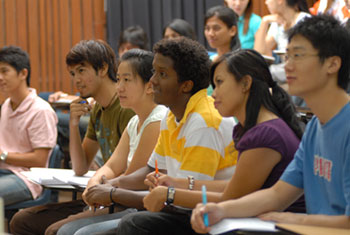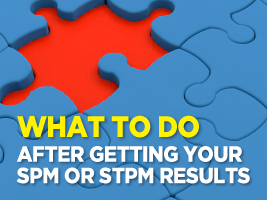How to Choose a Pre-U Programme : insights from Mr Lim Tou Boon, Taylor's College
by StudyMalaysia.com on September 15, 2014 | Top Stories, Pre-University Programmes & Foundation Studies
When the SPM exam is over in this coming December, many SPM holder students will be stepping up in their search for options in furthering their studies. In this article, StudyMalaysia interviews Mr Lim Tou Boon, President of Taylor's College, for some insight on how to choose the right pre-university programme and what Taylor's has to offer its students.
StudyMalaysia: There are many types of pre-university programmes in the market. What are some of the ways students can employ to make sure they choose the right one?
Lim: At Taylor's College, our mission is simple but challenging. Our mission reads: All Students in Universities of Their Choice. This means that for any student who has completed SPM, O-levels, or any Year 11 qualification and aspires to go to university, we are here to prepare them for success in life. To do that, we look at the skills that they will need: 1. learning skills, 2. life skills and 3. leadership skills.
The first, which is learning skills, is related to the choice of pre-university programme. We talk to students about learning skills because different students have different learning styles. Many of our students come from a background where the teaching approach is focused on the visual and auditory senses, e.g. the teacher talks and the student is supposed to listen, and copy or take notes. There are actually many learning styles, and particularly among the younger students, we find that they are visual-kinesthetic, which means that they like to learn through touch and play. As such, when it comes to choosing a suitable pre-university programme, we have to challenge students to think about which learning style would suit them best. Also associated with learning style is assessment style, which students must also consider.
 As an example, the A-level programme is very content intensive and its assessment style is focused on final examinations except for certain subjects. One hundred percent of the marks come from the final exams, requiring students to interact with a lot of content, understand it and then apply this knowledge in an examination setting where they have two to three hours to complete the examination. It can be very intense and there is no such thing as discussion with friends.
As an example, the A-level programme is very content intensive and its assessment style is focused on final examinations except for certain subjects. One hundred percent of the marks come from the final exams, requiring students to interact with a lot of content, understand it and then apply this knowledge in an examination setting where they have two to three hours to complete the examination. It can be very intense and there is no such thing as discussion with friends.
Conversely, some students prefer a learning environment that is more kinesthetic and interaction based. They work best when placed in a group doing projects and such. In the Canadian Pre-university programme (CPU), 70% of the assessment comes from course work, with much of it contributed through group work although there are also individual assignments.
StudyMalaysia: Besides a student's learning style, what other factors should students consider when choosing a suitable pre-university programme?
Lim: Another important factor is the timing of the programme, that is, the intake dates and its duration. The A-levels is done in 1.5 or 2 years, the IB diploma takes 2 years, whereas the South Australian Matriculation (SAM) and CPU are one-year programmes. For students who had decided to study in Australia for their first degree, we encourage them to take the one-year programme. This is because the exams will be completed in November (assuming they commenced their studies in January) and results released in December, allowing them to start at an Australian university in February the following year without waiting too long.
If a student wants to study in the UK, the A-level becomes the preferred choice as the intakes in January and April allow students to finish in June the following year. Results are released in August, in time for students to begin university in September.
That being said, students who choose to continue their studies at Taylor's University have the most options. Regardless of when they end their pre-university programme, they don't have to wait more than 2-3 months to begin a bachelor's degree. Taylor's University has undergraduate intakes in March and again in August to accommodate the different completion timings of pre- university programmes.
StudyMalaysia: If a student has yet to decide where he/she plans to pursue his/her first degree, would factors like the cost and recognition of the programme play a role in the choice of pre-u programme?
Lim: Definitely! That is why for students who are not sure - and we always get a large number of students who say they are not exactly sure what they want in terms of career choice or whether to study locally or overseas - we always tell them to consider academic recognition and the track record of the programme.
A qualification that is internationally recognised (and all pre-u programmes at Taylor's are) opens the door for students to study almost anywhere. In addition, we advise students to choose a programme based on the track record of the institution in producing students with strong results so that they are ensured of better chances of being accepted by the university of their choice.
StudyMalaysia: Are students who pursue CPU more inclined to choose Canadian universities for their first degree?
Lim: Yes, but this trend is apparent only in recent times. Previously, Australia was a popular choice but the strong Australian currency has made the AUD exchange rate comparable to that of the Canadian dollar. Further, the annual tuition fees in Canada are generally much lower than that of Australia, e.g. CAN15,000 compared to AUD30,000.
Nevertheless, SAM remains a popular programme. It is our oldest programme, offered since 1982, and our students also do very well.
StudyMalaysia: What type of skills does Taylor's equip the students?
Lim: At Taylor's, we aim to equip all students (regardless of their programme of study) with a set of skills called the Taylor's Graduate Capabilities (TGC). We don't just prepare students to do well in exams but we want them to have a set of capabilities that allows them to be successful in life. Our purpose is to educate the youth of the world to take their productive place as leaders in the global community.
So for our students to achieve this, we recognise that they must have learning skills, among others, that will help them to learn for life. Many students are not yet independent learners and that is why they struggle. They have been trained to memorise content and are not used to having to employ higher order thinking skills.
We prepare students for university and it is common that good universities require students to have a set of learning skills that will ensure they do well in their studies and their working life later. These skills include the ability to do research, analyse content, attribute the source correctly, and write reports. Many students are not aware that they cannot just use someone else's notes without giving the author due recognition, or copy and paste content from the Internet and claim it as their own.
Students are given the opportunity to learn and develop presentation skills, mind-mapping, designing, utilization of technology, problem- solving, working in groups, time management, negotiation skills and conflict resolution.
In addition, Taylor's has a dedicated university placement centre. We have very established relationships with both Malaysian and overseas universities. The university placement centre has a staff team of 12 members who help students with their university application. The staff at the centre also provides counselling to help students determine the choice of their university course.
StudyMalaysia: So does Taylor's employ a special programme for its students to learn these skills?
Lim: Besides incorporating these skills into day-to-day learning, we have a support unit where there is a learning advisor for each programme. These learning advisors conduct workshops and assign projects for students to help them learn skills in leadership, planning, goal setting, stakeholder management, budgeting, and so on. Students are also taught to reflect so they become more aware of what they have learned.
StudyMalaysia: What is the other distinguishing factors that Taylor's have?
Lim: Besides employing TGC to inculcate valuable skills in the students and giving them strong support in university placement, we ensure that teachers at Taylor's are competent. We have recently developed the Taylor's College Teacher Competency Standards. We place high importance on student engagement – teachers have to engage with students to find out how best they learn, their prior learning experiences, and so on.
Second, we create a learning environment where students enjoy learning. As such, the learning environment is not only in the classroom but all the informal learning spaces around the campus. We also get our teachers to focus on three types of learning environment i.e. face-to-face in a formal environment like the classroom, online or virtual and in an informal environment out of the classroom.
Third, we encourage our teachers to invest in their own professional growth and development. We want them to give feedback to students, experiment with new teaching and learning approaches and push themselves to higher standards. At the end of the day, I still believe that teachers are the ones who make all the difference.
©Challenger Concept (M) Sdn Bhd (StudyMalaysia.com)
Comparison of Pre-U Programmes
Table - A Comparison of Various Types of Pre-university Programmes:
| Types of Pre-University | Assessment Method | Duration of Study | No. of Subjects Studied/ (Typical Exam Result Announcement Date) |
Tuition Fee per Course (RM) |
|---|---|---|---|---|
Cambridge GCE A-Levels, UK |
100% external exam |
15-18 months |
2 – 5 subjects / (August/January) |
RM17,000 – RM32,000 for 3 subjects |
SAM, Australia |
70% college-based assessment and 30% external exam |
11 months |
5 subjects / (December) |
RM 21,000 – RM 27,000 |
AUSMAT, Australia |
50% college-based assessment and 50% external exam |
10 months |
5 subjects / (December) |
RM 17,000 – RM 27,000 |
CIMP, Canada |
70% college-based assessment and 30% external exam |
12 months |
6 subjects / (June/December, usually 1 month after exam) |
RM27,000 – RM31,000 |
International Baccalaureate Diploma Programme (IBDP), International |
30% college-based assessment and 70% external exam |
24 months |
6 subjects / (July/Jan) |
RM97,000.00 |
Monash University Foundation Year (MUFY) |
Internal continuous assessment and semester exam (=100%) |
10 months |
4/5 subjects / (July/December, usually within 2 months after exam) |
RM26,000 |
University of New South Wales (UNSM) Foundation Year |
50% college-based assessment and 50% external exam |
12 months |
5 subjects (Science) 6 subjects (Arts) / (End December) |
RM25,000 |
University's Internal Programme (private) |
Internal continuous assessment and semester exam (=100%) |
10 - 12 months |
5-6 subjects / (Varies) |
10,000 – 20,000 |
STPM, Malaysia |
20-40% by school-based assessment and 60-80% by external exam |
18 months (3 semesters) |
5 subjects / (March) |
Minimal fees (the programme is conducted at public schools) |
Source: Compiled by StudyMalaysia Research Team
(Note: All figures are estimates and merely serve as a guideline)
All rights reserved. No part of this editorial contents may be reproduced, copied, translated, or stored in a retrieval system or transmitted in any form or by any means without the written consent from the publisher, Challenger Concept (M) Sdn Bhd (www.studymalaysia.com/challenger)
You May Also Be Interested In...
What to do after getting your SPM or STPM results?
![What to do after getting your SPM or STPM results? - StudyMalaysia.com]() You’ve probably been feeling anxious for days in anticipation of you...
You’ve probably been feeling anxious for days in anticipation of you...Ten Careers In Sports You Should Consider (And You Don't Need To Be An Athlete)
![Ten Careers In Sports You Should Consider (And You Don't Need To Be An Athlete) - StudyMalaysia.com]() So you love sports? You want a career in sports but you're not qu...
So you love sports? You want a career in sports but you're not qu...myCourse Guide: Bachelor degree in Actuarial Studies & the Job of an Actuary
![myCourse Guide: Bachelor degree in Actuarial Studies & the Job of an Actuary - StudyMalaysia.com]() There is risk all around us - from fast-moving investment markets to t...
There is risk all around us - from fast-moving investment markets to t...Using the Course Interest Test to find out what’s right for you
![Using the Course Interest Test to find out what’s right for you - StudyMalaysia.com]() Now that you’ve got your SPM or STPM results, you might be anxious t...
Now that you’ve got your SPM or STPM results, you might be anxious t...Picking a Pre-U Programme - Part 4
![Picking a Pre-U Programme - Part 4 - StudyMalaysia.com]() Now that you know what pre-U options you have, it's time to make ...
Now that you know what pre-U options you have, it's time to make ...�So You Wanna Be a Mechanical Engineer
![�So You Wanna Be a Mechanical Engineer - StudyMalaysia.com]() Mechanical engineers create and build mechanical devices that are used...
Mechanical engineers create and build mechanical devices that are used...































